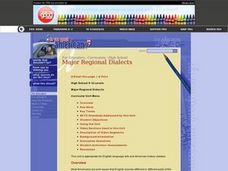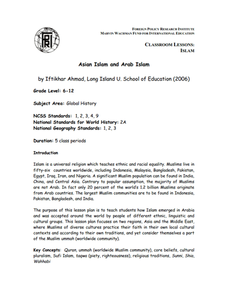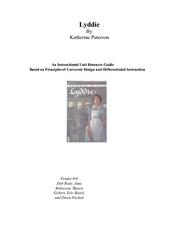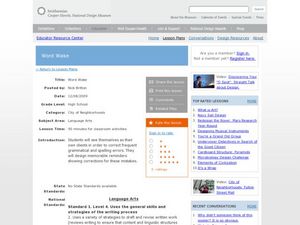Curated OER
Fun With Food
Students investigate the food pyramid and how to plan and eat a well balanced diet. They identify the foods on the food pyramid, and draw a picture of a balanced breakfast, lunch, and dinner. Next, they discuss the types of food they...
Curated OER
Major Regional Dialects
What does your dialect sound like? Examine variation in English as it relates to geographic regions with your class. They recognize some of the major differences between regional dialects and determine that everyone speaks a dialect....
Curated OER
Figure of Speech
Examine the changing nature of language in the U.S. View and discuss excerpts from a PBS documentary with your class and then conduct Internet research, and complete a team project on the evolution of teen expressions.
Foreign Policy Research Institute
Asian Islam and Arab Islam
Focus on the impact and practice of Islam throughout Asia and the Middle East. Learners review the seven major religions, the spread of Islam, and Islamic tenets commonly practiced. They then research one country that practices Islamic...
Curated OER
Lyddie: An Instructional Unit Resource Guide
Katherine Paterson’s young adult novel Lyddie is the foundation of a differentiated instruction unit that not only explores the rise of industrialization and labor but women’s rights issues as well. After learners read the novel, they...
Curated OER
Poetry Writing Unit: Writing a Film Poem
Film poems? To concluded a poetry unit, writers select one of their own poems and create a film that brings to life the sounds and images of their work. Included with the detailed unit plan are daily lessons, student examples, a list of...
Ontario
Critical Literacy—Media Texts
Media texts convey both overt and implied messages. As part of their study of media, class members analyze the language, form, techniques, and aesthetics in a variety of media texts.
Curated OER
A Modest Proposal: Irony Made Understandable with Rock and Roll
Who doesn't love music? Poems and songs will engage your high school class in a discussion about irony. Use songs like "Rockin' in the Free World" or "Born in the U.S.A." to illustrate the ironic point of view. Print the lyrics so...
Curated OER
French Connections
High schoolers use Internet links to plan a 3-day tour of France. They role-play a typical encounter that may be experienced during their trip.
Lerner Publishing
Meet the Dinosaurs
Take your class of youngsters on a prehistoric adventure with this four-lesson series on dinosaurs. Accompanying the Meet the Dinosaurs books by Don Lessem, these lessons engage children in writing their own dinosaur books, making...
Lerner Publishing
Teaching Habitats
What makes up a habitat? Use this resource to engage first graders in the exploration of desert, wetland, forest, and ocean habitats. Youngsters classify plants and animals into the four distinct habitats through drawings and cutting and...
Ontario
Reading Informational Text
Learning to recognize the importance of the features of information text (i.e., titles, subtitles, endnotes, sidebars, etc.) is the focus of a reading activity designed for middle schoolers. Learners examine how these text features help...
Ontario
Reading Graphic Text
Do students really need to be taught how to read cartoons, comic books, and comic strips? Yes. Just as they need to learn how to read other forms of graphic text such as diagrams, photos, timetables, maps, charts, and tables. Young...
Blake Education
Harry Potter and the Philosopher’s Stone
The motto for Hogwarts School of Witchcraft and Wizardry warns that one should never tickle a sleeping dragon, but learners will definitely be tickled by the activities in a packet of materials designed to accompany a reading of the...
Curated OER
Back-to-school ESL Ideas
Learners share their countries and languages, flags, cultural identity, and pride in home culture.
Curated OER
How Do You Say Hello?
Students access an online resource to study how to say hello in Spanish, Japanese, and Arabic. They complete a worksheet telling how to say hello in these three languages before practicing the proper pronunciation of each.
Curated OER
From Seed to Plant
First graders listen to the book, FROM SEED TO PLANT by Gail Gibbons and identify the process by which a seed becomes a plant. They discover the names of the parts of a plant as well as what is needed for it to grow. They wrap up the...
Curated OER
Desert
Students explore desert landscapes and the animals that inhabit the desert. They discuss deserts and the animals that live there. Students compose a story using the correct sequence and illustrate the story with items they would find in...
Curated OER
Eggs
Third graders examine a variety of information about eggs. They complete a class KWL chart, and read "Green Eggs and Ham" and "The Eggs Are Hatching" by Monica Incisa and discuss the fictional and non-fictional aspects of each book. In...
Curated OER
Connecting Families through Folk Stories and Fairy Tales
Learners engage their families to write down a folk story from their primary language. In this family literacy lesson plan, students rewrite the story or fairy tales in English. Parents and learners are invited to present the stories in...
Curated OER
Word Wake
Put your common writing errors to rest with this resource, which prompts high schoolers to create eulogies and tombstones for overused and incorrect words. They work on correcting common errors in spelling and usage mistakes in their own...
Curated OER
Metaphor
High schoolers identify the distinction between literal and figurative language with a focus on metaphors. They complete a metaphor analysis chart, then practice expanding metaphors by composing their own comparisons of elements of the...
Curated OER
Tolerance in Times of Trial
Students view the treatment of people of Japanese and German descent during World War II. They explore the problems in assigning blame to populations during times of war. They identify modern examples of discrimination and stereotyping.
Curated OER
Immigration Unit
Third graders develop an appreciate for the various cultures that are present in their local community. Through reading and research, they explain how various culture came to live in their area. At the conclusion of the unit, 3rd...

























